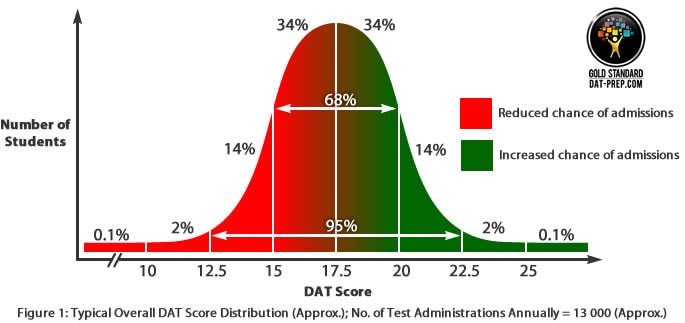The Dental Admission Test is the standardized test mandatory for all dental schools. The DAT helps admissions committees compare students "apples-to-apples." Although it may seem intimidating, the DAT is certainly manageable if you know how to prepare.
What's On It
The DAT includes questions from natural sciences (biology, general chemistry, and organic chemistry), reading comprehension, quantitative reasoning, and a perceptual ability test (PAT).
Survey of natural sciences: Biology (40 questions), Organic chemistry (30 questions), General chemistry (30 questions)
Perceptual ability: 90 questions (this has to do with 3D development and folding)
Reading comprehension: 50 questions from 3 reading passages
Quantitative reasoning: 30 mathematical questions and 10 applied mathematical questions
Test taking time: 4 hours and 30min
Survey of natural sciences: Biology (40 questions), Organic chemistry (30 questions), General chemistry (30 questions)
Perceptual ability: 90 questions (this has to do with 3D development and folding)
Reading comprehension: 50 questions from 3 reading passages
Quantitative reasoning: 30 mathematical questions and 10 applied mathematical questions
Test taking time: 4 hours and 30min
How To Prepare
|
Kaplan Courses:
This bestselling guide provides the targeted training and preparation students need to maximize their Dental Admissions Test score. Kaplan DAT features vivid color instructional charts and diagrams to make learning more memorable, two full-length practice tests with detailed answer explanations, intensive science and quantitative review, Reading Comprehension practice test, effective strategies to maximize your score, and realistic, exclusive exercises created especially for the Perceptual Ability Test (PAT). AED members get 15% off of Kaplan materials! Reach out to us here to get the code. Princeton Review: Winning admission to dental school isn't easy, and scoring well on the DAT (Dental Admission Exam) is a critical part of your profile as a competitive applicant. The Princeton Review's DAT 20+ contains everything you need to prepare for this important test, including: · Access to 4 full-length practice DAT exams · Cracking the DAT textbook · Strategies for the Math, Perceptual Ability, and Reading sections · 4,600+ exam-style questions · 3D Practice kit for PAT AED members get 15% off of Princeton Review materials! Reach out to us here to get the code. |
Practice Exams and Questions
- Kaplan Practice Test Pack: $149 - Kaplan Self Study Bundle: $199 - Kaplan QBank: $99 -Princeton Review: Free online practice test |
Scoring
DAT scores are reported by the ADA (American Dental Association).
The test is not based on a curve. Essentially, DAT performance is measured using an ability-referenced system. Based on standard scores, your abilities (i.e. knowledge and problem solving skills) are directly compared to that of the other DAT examinees. The DAT has 8 scores, 6 of which are from each of the test sections and 2 of which are summaries of the 6 test sections.
The two summary scores are Total Science (TS) and Academic Average (AA). The Total Science score is the standard score for the 100 questions in the Survey of Natural Sciences as a whole – NOT THE AVERAGE OF THE STANDARD SCORES of the Science subtests. This is derived from the sum of your raw scores each in biology, general chemistry, and organic chemistry. The total score is then converted to a standard score for Total Science. In contrast, a score in the Academic Average is the rounded average of the standard scores from the reading comprehension (RC), quantitative reasoning (QR), biology (BIO), general chemistry (CHM), and organic chemistry (ORG) tests.
The Perceptual Ability Test (PAT) is scored on a scale of 1-30, and has a score that stands on its own.
The average score for MUSC is 20 AA /21 DAT (this information was last updated July 5th, 2023)
The test is not based on a curve. Essentially, DAT performance is measured using an ability-referenced system. Based on standard scores, your abilities (i.e. knowledge and problem solving skills) are directly compared to that of the other DAT examinees. The DAT has 8 scores, 6 of which are from each of the test sections and 2 of which are summaries of the 6 test sections.
The two summary scores are Total Science (TS) and Academic Average (AA). The Total Science score is the standard score for the 100 questions in the Survey of Natural Sciences as a whole – NOT THE AVERAGE OF THE STANDARD SCORES of the Science subtests. This is derived from the sum of your raw scores each in biology, general chemistry, and organic chemistry. The total score is then converted to a standard score for Total Science. In contrast, a score in the Academic Average is the rounded average of the standard scores from the reading comprehension (RC), quantitative reasoning (QR), biology (BIO), general chemistry (CHM), and organic chemistry (ORG) tests.
The Perceptual Ability Test (PAT) is scored on a scale of 1-30, and has a score that stands on its own.
The average score for MUSC is 20 AA /21 DAT (this information was last updated July 5th, 2023)

